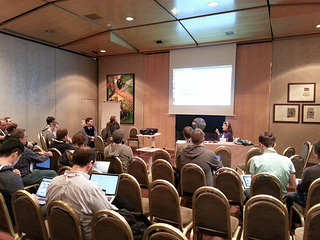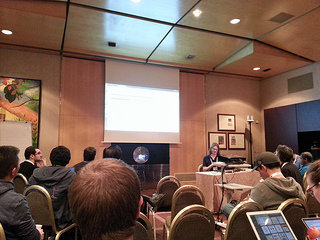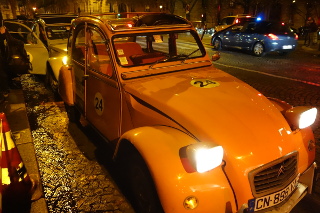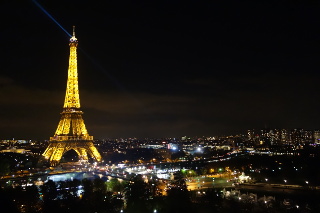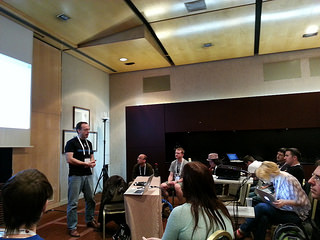As the OpenStack Summit continued for those of us on the development side, Wednesday and Thursday were full of design sessions.
First up for me on Wednesday was a great session about the Infrastructure User Manual led by Anita Kuno. A pile of work went into this while we were at our mid-cycle Infrastructure sprint in July, but many of the patches have since been sitting around. This session worked to make sure we had a shared vision for the manual and to get more core contributors both reviewing patches and submitting content for some of the more complicated, institutional knowledge type sections of the manual. The etherpad for the session is available here.
The session on AFS (Andrew File System) for the Infrastructure team was also on Wednesday. In spite of having a lot of storage space at our disposal and tools like Swift (which we’re slowly moving logs to), there are still some problems we’re seeing to solve that a distributed filesystem would be useful for, enter the AFS cell set up for the OpenStack project. The session went through some of the benefits of using AFS in our environment (such as read-only replicas of volumes, heavy client-side caching support and more comprehensive ACLs than standard Unix filesystem permissions). From there the discussion moved on to how it may be used, some of the popular proposals were our pypi mirror, the git repos and documentation. Detailed Etherpad here.
There were also a couple QA/Infra sessions, including one on Gating Relationships. At the QA/Infra mid-cycle meetup back in July we touched upon some of the possible “over-testing” that may be done when a change in one project really has no potential to impact another project, but we run the tests anyway, using up testing resources. However, there isn’t really any criteria to follow for determining what changes and project combinations should trigger tests, and it was noted that many of what seem like unnecessary testing was actually put in place at one point to address a particular pain point. The main result of this session was to try to develop some of this criteria, even if it’s manual and human-based for now. Detailed Etherpad here.
We also had a QA and CI After Merge session. Currently all of our tests are pre-merge, which makes sure all code that lands in the development repository has undergone all official tests that the OpenStack CI system has to offer. This session discussed whether heavier, less “central” tests to the projects be tested post merge or with periodic tests, with what I believe was some consensus: We do want to split out some of the current gated jobs. Several todo items to move this forward were defined at the bottom of the etherpad.
I also attended the “Stable branches” session (lively etherpad here). Icehouse’s support is 15 months and the goal seems to be to support Juno for a similar time frame. Several representatives from distributions were attending and giving feedback about their own support needs and there seems to be hope that there will be work from folks from distros committing to do some of the maintenance work.
There were also a couple sessions about Tempest, the integration test suite. First there was “Tempest scope in the brave new world” which focused on the questions around what should be in Tempest moving forward and what the project should consider removing as the project moves forward. Etherpad for the session here. There was also a “Tempest-lib moving forward” session, which discussed this library that was created last cycle and various ways to improve it in the coming cycle, details in the Etherpad here.
Wednesday evening I made my way over to the Core Reviewer party put on by HP at the near rooftop event space of Cité de l’Architecture et du Patrimoine. We were driven there by what was described as “iconic, old French cars” which turned out to be the terrifying Citroën 2CV. And our drivers were all INSANE in Paris traffic. Fortunately no one died and it was actually pretty fun (though I was happy to see buses would be taking us back to the conference venue!).
The night itself kicked off with a lecture on the architecture of the Sagrada FamÃlia BasÃlica in Barcelona by one of the people currently working on it, and which drew some loose parallels between our own development work (including the observation that Sagrada FamÃlia is not complete – a 140+ year release cycle!). They also brought in entertainment in the form of several opera singers who came in throughout the night. Some food was served, but I spent much of the night outside chatting with various of my OpenStack colleagues and drinking so much Champagne that the outdoor bartender learned to pull out the bottle as soon as he saw me coming. Hah!
My favorite part of the night was the stunning view of the Eiffel Tower. It’s a beautiful thing on its own at night, but at the top of the hour it also sparkles for 5 minutes in a pretty impressive show. I was so caught up in discussions that I didn’t manage to go on the museum tour that was offered, but I heard good things about it today.
Then it was on to today, Thursday! I had a great chat with Steve Weston about the third party dashboard we’re working on before Anita came to find me so I wouldn’t be late for my own session (oops).
My (along with Andreas Jaeger’s who I saved a seat for up front) session was an infrastructure session on Translations Tools. We’re currently using Transifex but we need to move off of it now that they’ve transitioned to a closed source product. As I mentioned in my last post, we decided to go with Zanata so the session was primarily to firm up this decision with the rest of the infrastructure team and answer any questions from everyone involved. I have a lot of work to do during the Kilo cycle to finally get this going, but I’m really excited that all the work I did last cycle in getting demos set up and corralling the right talent for each component has finally culminated in a solid decision and action items for making the move. Next week I’ll start working on the spec for the transition. Etherpad here.
I attended a few other sessions, but the other big infrastructure one today was about Storyboard, the new task and bug tracker being written for the project to replace Launchpad. Michael Krotscheck has been doing an exceptional job on this project and the first decision of the session was whether it was ready for the OpenStack Infrastructure team to move to – yes! The rest of the session was spent outlining the key features that were needed to have really good support for infrastructure and to start supporting StackForge and OpenStack projects. The beautiful Etherpad that Michael created is here.
Tonight I went out with several of my OpenStack colleagues to dinner at La maison de Charly for delicious and stunningly arranged Moroccan food. I managed to get back to my room by 9PM so I could get an early night before the last day of the summit… but of course I got caught up in writing this, checking email and goofing off in IRC.
Tomorrow the summit wraps up with a working day with an open agenda for all the teams, so I’ll be spending my day in the Infra/QA/Release Management room.


